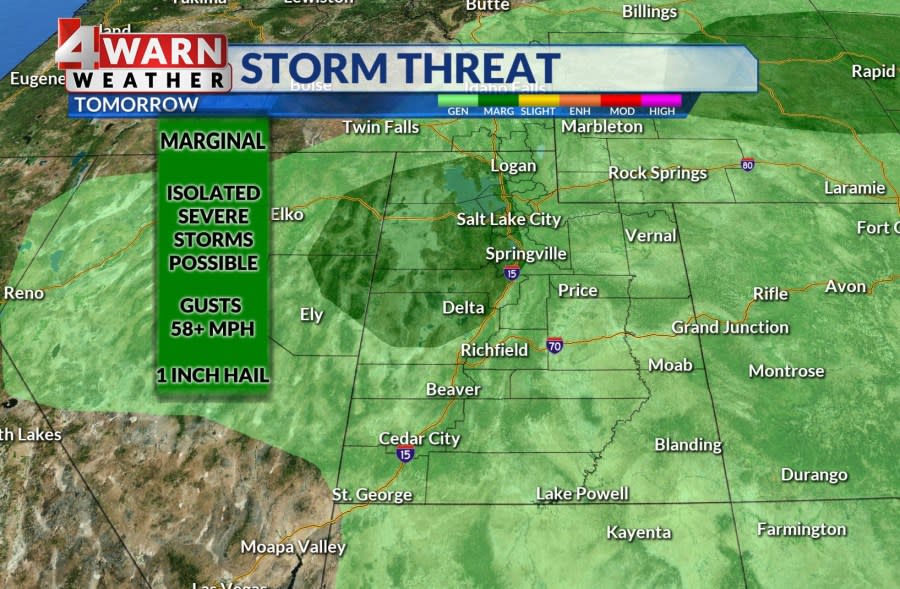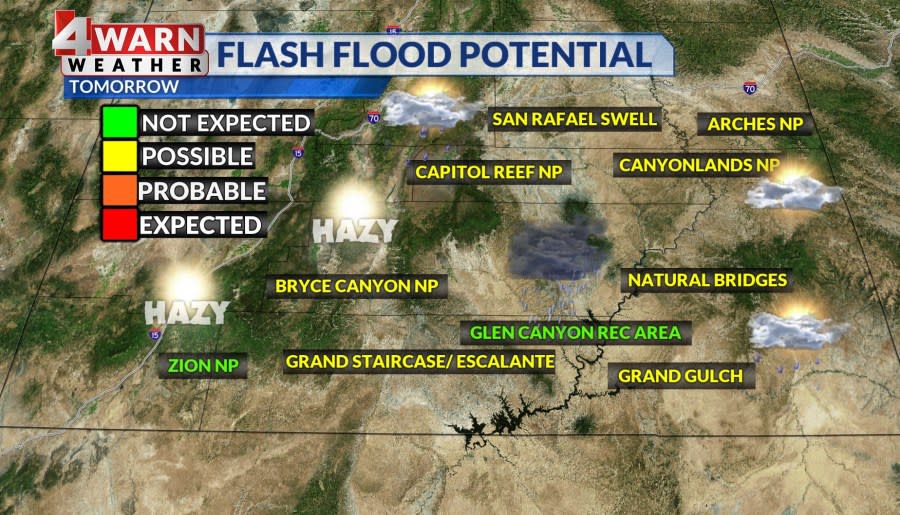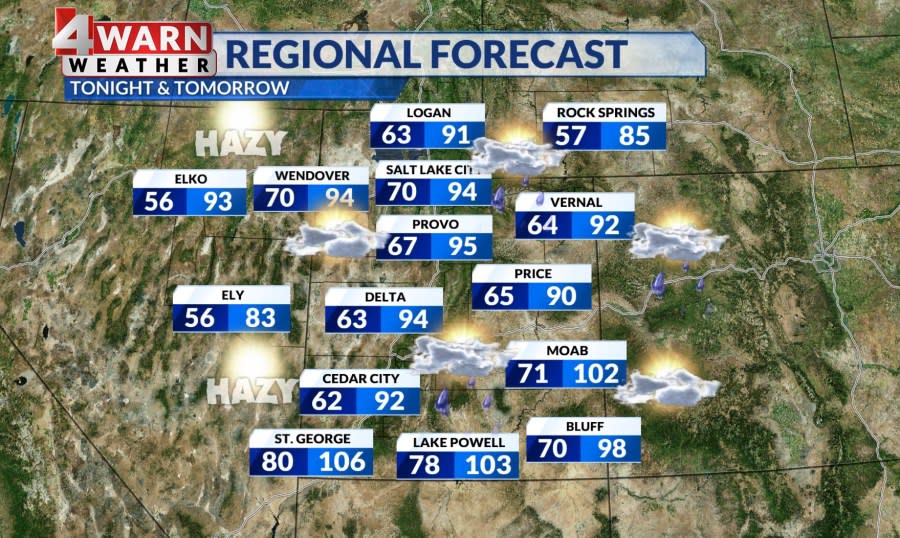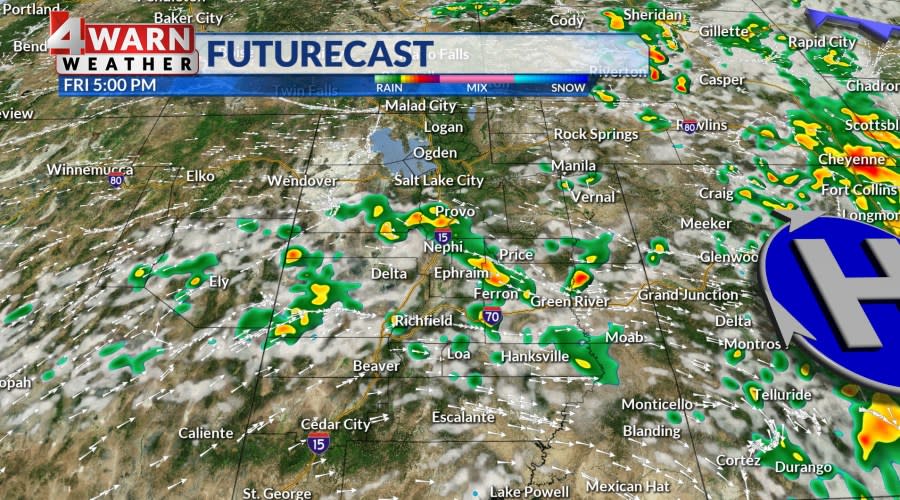Utah
Utah Athletes Claim Bellin Run Titles

GREEN BAY (WLUK) — Two athletes from the state of Utah finished with the fastest times in the Bellin Run 10k on Saturday.
Finishing with a time of 30:03 in the men’s category, Jared Ward of Mapleton, Utah claimed his 4th Bellin title in the 10K. He previously won in 2019, 2022, and 2023.
Following the race, Ward said the only word to describe being a 4-time champ was “surprised.”
“I had PRP in my high hamstring earlier this year, was out for a while,” he says. “Like, this is the most, the longest break I’ve had since I served a two-year mission after high school 15 years ago, so I’m raw. It hurt today, I’m grateful it’s still in there deep down, but it was a battle from two and a half miles out with my training partner and friend back at home, Jake, and it was a treat to run next to him on these beautiful roads in this beautiful town, I love your community.”
Jake Heslington of Provo, Utah took second place in his first Bellin Run race, just one second behind Ward. Heslington competed at the 2024 Olympic Marathon trials.
In the women’s 10K, elite runner Sarah Sellers of Ogden, Utah won her first Bellin Run with a time of 35:12, defeating defending champion Kathy VenDehy of Menasha. Both athletes competed at the 2024 Olympic Marathon trials.
“I feel really good, I think 10Ks are really fun because you get to push yourself, but not get as beat up as a full marathon. You still get the race effort but then you finish and you’re not hobbling, it feels pretty good,” Sellers said following her win.
Top 5 men’s 10K overall:
1. Jared Ward, Mapleton, Utah – 30:03
2. Jacob Heslington, Provo, Utah – 30:04
3. Noah Jahnke, Green Bay – 31:08
4. David Ecker, Green Bay – 31:32
5. Mason Gates, Manitowoc –31:46
Top 5 women’s 10K overall:
1. Sarah Sellers, Ogden, Utah – 35:12
2. Allyson Verbauwhede, Whitelaw – 36:07
3. Elizabeth Kujawa, Berlin – 37:41
4. Liz Kanzleiter, Suamico – 37:48
5. Maggie Priebe, Green Bay – 37:51
In a press release, Bellin Run organizers say the records for the men’s and women’s race still stand, but some new records were set on Saturday. The release reads:
Joseph Kimani retains the men’s course record of 27:46, set in 1997; and Tegla Loroupe holds the women’s course record with a time of 31:48, set in 1999. There was, however, a new age group record set:
Males ages 70-74 — Joseph Reda III, 43:37
Males ages 85 and over — Harry Belongy. 1:33:19
Females ages 85 and over — Nicole Ferry, 1:05:28
Full race results and photos can be found on the Bellin Run website, here.

Utah
Utah officials deny clemency for man set to be executed for 1998 killing of his girlfriend’s mother – WTOP News
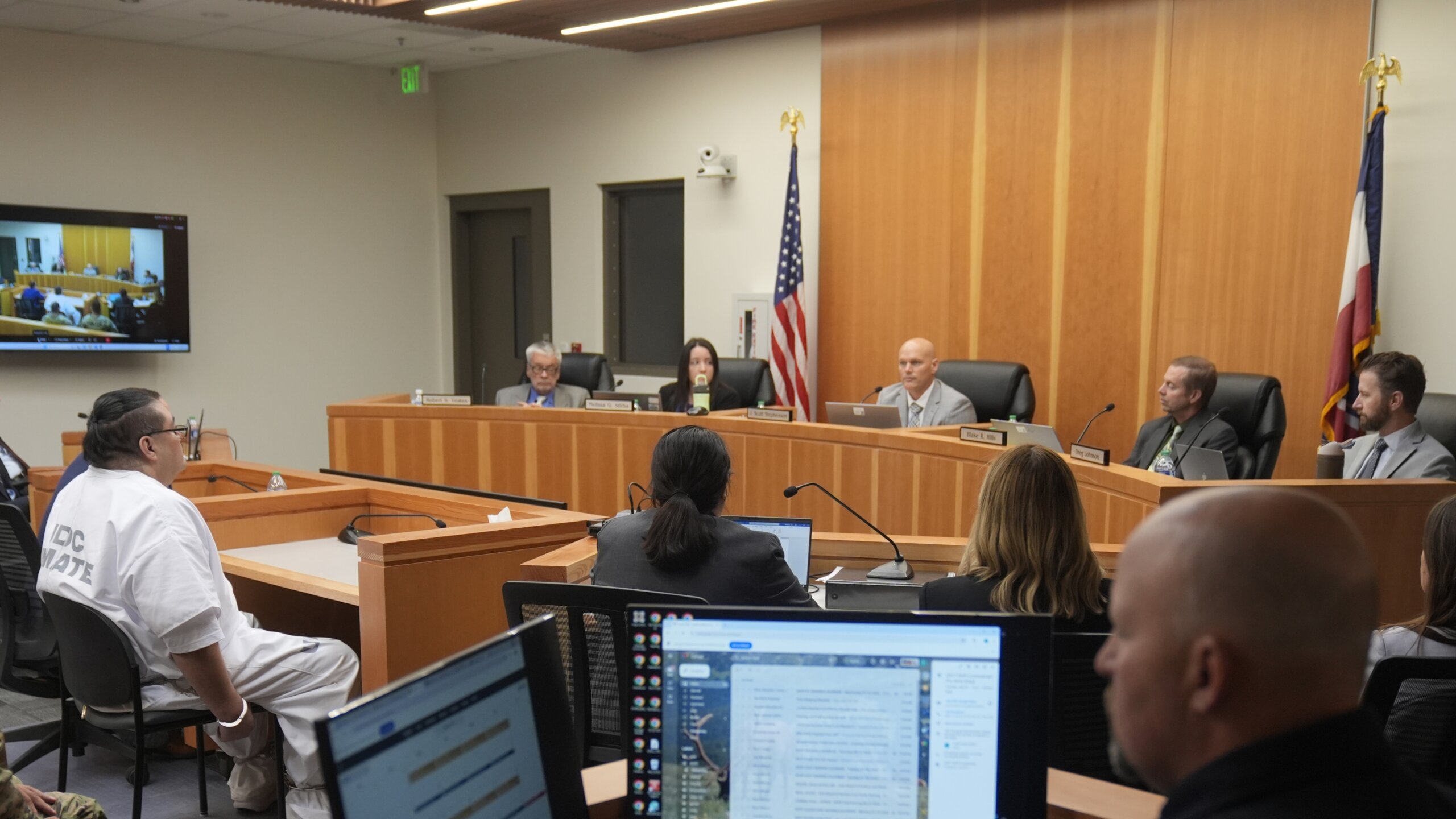
SALT LAKE CITY (AP) — Utah officials denied clemency Friday to a man who is set to be executed for…
SALT LAKE CITY (AP) — Utah officials denied clemency Friday to a man who is set to be executed for the stabbing death of his girlfriend’s mother in 1998.
The decision regarding the fate of Taberon Dave Honie, who is scheduled to die by lethal injection Aug. 8, was announced in a one-paragraph notice from Scott Stephenson, chair of the Utah Board of Pardons and Parole.
“After carefully reviewing all submitted information and considering all arguments from the parties, the Board does not find sufficient cause to commute Mr. Honie’s death sentence,” Stephenson wrote.
During a two-day commutation hearing this week, Honie asked the parole board to commute his sentence to life in prison, saying he would never have killed 49-year-old Claudia Benn after a day of heavy drinking and drug use had he been in his “right mind.”
Honie said he wanted to continue to live to be a support for his mother and his daughter. His attorneys did not immediately respond to telephone and email messages seeking comment on the clemency denial.
Benn’s family urged the parole board to allow him to be executed, saying they have been devastated by their loss.
They described Benn as a pillar in their family and southwestern Utah community — a tribal council member, substance abuse counselor and caregiver for her children and grandchildren.
Honie, who had a volatile relationship with Benn’s daughter, broke into the victim’s house in Cedar City, the tribal headquarters of the Paiute Indian Tribe of Utah, on July 9, 1998.
He repeatedly slashed her throat and then stabbed her. Benn’s grandchildren, including Honie’s 2-year-old daughter, were in the house at the time.
“The way he killed her, that’s just sick. … An eye for an eye, as God says it,” Sarah China Azule, Benn’s niece, said during testimony.
Honie was convicted in 1999 of aggravated murder. The judge who sentenced him to death found that Honie had sexually abused one of the children, one of the aggravating factors used to reach that decision.
During the hearing, Honie’s attorneys presented testimony describing his traumatic childhood growing up on the Hopi Indian Reservation in Arizona.
His parents, like many Native Americans, had been put into into government boarding schools that were often abusive, and the defense argued that they did not learn parenting skills, were heavy drinkers and neglected Honie, who began drinking and using drugs including cocaine, heroin and methamphetamine by the time he was a teenager.
But the state told the board that Honie created more trauma by killing Benn.
“Imagine the intergenerational traumas from Honie’s horrific acts trickling down through time,” Assistant Solicitor General Daniel Boyer said.
Utah has not had an execution since Ronnie Lee Gardner was put to death by firing squad in 2010.
Honie is one of six people awaiting execution in the state. The death sentence for a seventh person, Douglas Lovell, who killed a woman to keep her from testifying against him in a rape case, was overturned Thursday by the Utah Supreme Court. He will be resentenced.
After decades of failed appeals, Honie’s execution warrant was signed in June despite defense objections to the planned combination of the sedative ketamine, the anesthetic fentanyl and potassium chloride to stop his heart. When Honie’s attorneys sued, corrections officials agreed to switch to pentobarbital but the case is still pending.
One of his lawyers said previously that the defense was reviewing information regarding the change and working to protect his constitutional rights.
“Serious uncertainty still remains about the state’s last-minute execution plan,” attorney Eric Zuckerman said.
Prison officials have agreed to let one of Honie’s lawyers have access to a phone while witnessing the execution in case an emergency motion needs filing, according to a Wednesday court order.
___
Slevin reported from Denver, and Brown from Billings, Montana.
Copyright
© 2024 The Associated Press. All rights reserved. This material may not be published, broadcast, written or redistributed.
Utah
Temps drop with storms lingering across Northern and Central Utah

SALT LAKE CITY (ABC4) — This week, we’ve seen record heat, flash flooding in parts of Southern Utah, and strong thunderstorms impact parts of the Wasatch Front. A drier air mass moves in from the southwest today, but there will still be enough lingering moisture for isolated thunderstorms. As we close out the work week temperature-wise, we are seeing more seasonal temperatures as our ridge of high pressure breaks down and pulls southeast. Daytime highs will be in the mid-90s along the Wasatch Front with more triple-digit temperatures for St. George.
FRIDAY: Lingering moisture allows for isolated t-storms in the afternoon/evening as a trailing disturbance behind the main cold front moves through. Marginal risk for storms for parts of West Desert & Wasatch Front. Seasonal temps in the north, hot still in South- #utwx pic.twitter.com/pF05kqoAtF
— Alana Brophy (@AlanaBrophyWX) July 26, 2024
With isolated storms possible, we have a ‘Marginal’ risk of isolated severe thunderstorms for parts of the West Desert Utah, including portions of the Wasatch Front this evening where the primary threat will be strong wind gusts. Severe thunderstorms can bring an abundance of lightning, wind gusts of 58+ mph, and large hail. St. George only has a slight chance of a storm today, and our flash flood risk is still possible for many locations including our National Parks except Zion and near Lake Powell.
Another weak disturbance brushing by on Saturday will bring a few showers and thunderstorms to northern Utah. Drier air in the south should end the storms, but strong southwesterly winds could create critical fire weather conditions. A fire weather watch has been issued for Saturday afternoon for portions of Central and Southern Utah due to the potential of gusty winds to 35 mph and low relative humidity.
FIRE WEATHER WATCH: This is for Saturday as significant drying takes place across southern & central Utah. SW winds increase leading to the potential for critical fire weather conditions due to gusty winds and low humidities across southern and portions of central Utah#utwx pic.twitter.com/SU4qrO9bkA
— Alana Brophy (@AlanaBrophyWX) July 26, 2024
By Saturday, drier air moving in from the southwest will push moisture out of the state Saturday evening. Sunday will be dry across the region with seasonal highs and lighter winds. The ridge will rebuild over the area early next week with a rebound to above-normal temperatures through midweek. Moisture will also return to areas of southern Utah by midweek, increasing chances of afternoon thunderstorms.
Copyright 2024 Nexstar Media, Inc. All rights reserved. This material may not be published, broadcast, rewritten, or redistributed.
For the latest news, weather, sports, and streaming video, head to ABC4 Utah.
Utah
Is JD Vance’s working-class conservatism the future of the GOP? Utah's youngest lawmaker hopes the answer is 'yes'
Utah’s youngest state lawmaker brought his working-class roots to Washington, D.C., this month as part of a movement trying to change the course of the Republican Party.
Rep. Tyler Clancy, R-Provo, age 27, spoke on July 9 at the fourth “National Conservatism” convention, comprised of political leaders, professors and policy wonks hoping to steer the GOP away from corporate influence and toward a blue-collar populism to advance an “America First” agenda.
“As elected officials, we have more accountability to the people of America rather than companies that try to run this country,” Clancy said during his speech. Republicans are tasked with being a “check on the centralization of power by a few,” Clancy said, whether that be in the federal government or the marketplace.
Concluding the three-day-long event was an address from Ohio Sen. JD Vance, featuring a more culturally aggressive, less economically laissez-faire approach to GOP governance. Less than a week later, Vance was chosen by former President Donald Trump as his vice presidential pick in the 2024 general election and declared, by some, as the new face of the Republican Party.
While Clancy considers himself a limited-government conservative, the up-and-coming state lawmaker believes Vance is representative of an emerging crop of Republican leaders who view policy areas like more family benefits, bringing manufacturing jobs back to the U.S. and regulating “big pharma” as just as essential to conserving the American Dream as pushing for lower taxes on businesses.
“I definitely think you’ll see a shift with the younger generation,” Clancy said in an interview with the Deseret News. “We want to stand up for the working class, we want to make sure that people who are in this country and work hard and play by the rules can feed their families, make sure one medical emergency doesn’t put them into bankruptcy and make sure that we’re balancing all interests, not putting some over others, i.e., Wall Street and massive multi-national corporations.”
An evolving Republican Party
Nearly one hundred years ago, the Republican Party redefined itself in opposition to the New Deal’s tax-and-spend welfare state.
As the de facto party of smaller government, the GOP developed a “strong pro-business constituency” who benefited from lower taxes, fewer regulations and limited government intervention in the economy, said Damon Cann, chair of the political science department at Utah State University and former mayor of North Logan from 2018-2021.
But, according to Cann, Trump’s 2016 ascendancy, propelled by shift in support from white-collar to working class voters, is not without precedent in the Grand Old Party.
“There have been elements of these attitudes and beliefs lying just below the surface in the Republican Party, and I think it’s more that Trump capitalized on them than he created them,” Cann said.
The Great Recession of 2008, the collapsing trust in institutions and the influence of globalization set the stage for a GOP base that was more willing to reject elite economic opinion and international trade agreements in favor of preserving entitlement programs and subsidizing American industries, Cann said.
An example of this change in tone can be seen in Mitt Romney’s prescription in 2008 to encourage the market’s creative destruction by “letting Detroit go bankrupt”, compared to what Cann said was Trump’s message: “I’m going to fight for the lower and middle class workers who are falling as victims of globalization, whose jobs are being outsourced from United States.”
Trump’s new running-mate Vance has stated his support for the former president’s proposed agenda of “broad-based tariffs, especially on goods coming in from China” to “protect American industries from all of the competition.” Vance has introduced new railway safety regulations and has praised the Biden-appointed Federal Trade Commission Chair Lina Khan, known for her aggressive antitrust stance against large tech companies, as “doing a pretty good job.”
Maybe the biggest indicator yet of the GOP’s increasing openness to populist economic policies was the invitation for Sean O’Brien, the president of Teamsters, one of the nation’s largest private sector unions, to speak at the Republican National Convention last week.
Clancy, who has the endorsement of the Teamsters’ local chapter and the operating engineers union in Utah, said he was excited to see organized labor “start to play a role again in Republican politics.”
“Unions are a puzzle piece of our economy and help workers bargain for better wages, better worker safety, health insurance, pensions, etc.,” Clancy said.
Can the GOP be pro-business and pro-worker?
The GOP is unlikely to lose its business constituency even if Republicans continue to flirt with pro-union figures, or feature proposals to increase regulations on “big tech” or revoke China’s favored trading status, because “where else will they go?” Cann said.
“At least at present, the Democratic Party isn’t offering an attractive alternative to Republicans,” Cann said.
But it’s not the change in rhetoric that worries Derek Miller, the president and CEO of Salt Lake Chamber. It’s the prospect of a Republican Party that ceases to prioritize the principles that promote job growth and prevent economic stagnation — the principles, Miller said, that have allowed Utah to build “the most robust and prosperous economy” in the nation by “unleashing the power of free enterprise.”
“We talk about economy, we talk about business, but at the end of the day what we’re really talking about is people,” said Miller, who previously served as chief of staff to former Gov. Gary Herbert. “It’s people who start businesses. It’s people who run businesses. It’s people who make businesses successful. So to that the extent the Republican Party wants to be more focused on people I think that’s a welcome thing.”
As a former staffer in Washington, D.C., and then as the director of Utah’s Department of Commerce and the Governor’s Office of Economic Development, Miller said he has seen how tried and true Republican instincts to get government out of business lead to positive impacts for Americans.
Miller said regulations are critical to “protecting the public” and “creating a level playing field for businesses.” But, he added, “I can’t think of a single thing that would jumpstart our national economy more” than getting rid of excessive regulation.
For Clancy, the shift he most wants to see within his party isn’t necessarily toward, or away from, specific free market policies. It’s a shift toward addressing the needs of working families who haven’t traditionally had much access to political representation and bringing “hope to this part of America that’s been left behind.”
“As public servants, we shouldn’t limit ourselves to a religious-type orthodoxy of political leaders in the past,” Clancy said. “It’s more of a call for leaders to really dig in, learn the needs of our community and apply those conservative principles to 21st century problems.”
-

 World1 week ago
World1 week agoOne dead after car crashes into restaurant in Paris
-

 Midwest1 week ago
Midwest1 week agoMichigan rep posts video response to Stephen Colbert's joke about his RNC speech: 'Touché'
-

 News1 week ago
News1 week agoVideo: Young Republicans on Why Their Party Isn’t Reaching Gen Z (And What They Can Do About It)
-

 Movie Reviews1 week ago
Movie Reviews1 week agoMovie Review: A new generation drives into the storm in rousing ‘Twisters’
-

 News1 week ago
News1 week agoIn Milwaukee, Black Voters Struggle to Find a Home With Either Party
-

 Politics1 week ago
Politics1 week agoFox News Politics: The Call is Coming from Inside the House
-

 News1 week ago
News1 week agoVideo: J.D. Vance Accepts Vice-Presidential Nomination
-

 World1 week ago
World1 week agoTrump to take RNC stage for first speech since assassination attempt






